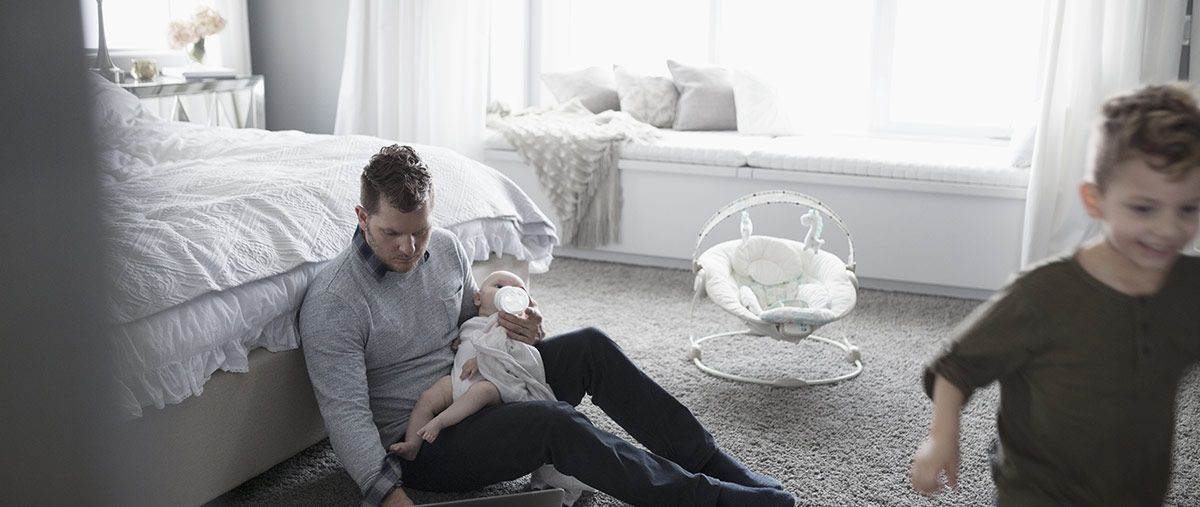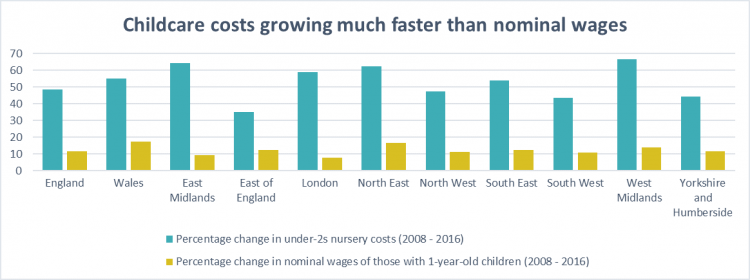
Working parents feel the squeeze as childcare costs rise four times faster than wages
For parents with a one-year old child, the cost of their child’s nursery provision has grown four times faster than their wages.
Between 2008 and 2016, the average cost of placing a child under the age of two in nursery grew by 49%.
During the same period, wages for parents with a one-year old child grew by just 12%. And this is a nominal increase – real wages are still below their 2008 level.
On average, 21 hours of nursery provision cost around £67 back in 2008. By 2016, that had risen to £99. Quite the jump. We use 21 hours as our benchmark because it’s the median amount of childcare used per week for pre-school age children.
While the growth of childcare costs far out-paces the growth of wages across the country, some regions have been hit harder than others.
In London, for example, the cost of childcare for under-twos has grown by 59%. Wages for the parents of one-year-olds, however, have risen by just eight per cent.

In London, for example, the cost of childcare for under-twos has grown by 59%. Wages for the parents of one-year-olds, however, have risen by just eight per cent.
This means that the cost of childcare has risen over seven times as quickly as the wages of the mums and dads having to pay for it.
Second to London is the East Midlands, where weekly nursery costs for under-twos have gone up by 64%. Wages for the parents of one-year-olds have gone up just nine per cent.
But it’s important to remember that there’s no region where the cost of childcare isn’t growing faster than wages. Even in the east of England, where the out-pacing is the slowest, childcare costs grew almost three times as quickly as wages between 2008 and 2016.
More of parents' wages going on childcare
When nursery costs rise much quicker than wages, parents are left paying a higher share of their wages towards childcare.
Although it’s quite a crude measure, this is clear when you look at average childcare costs as a percentage of average wages.
A single parent working full-time with a one-year-old in nursery for 21 hours a week spent more than 1/5th (21%) of their wages on childcare in 2016. This is up from around 1/6th (17%) in 2008.
If one parent is working full-time and another working part-time, the costs of placing their one-year-old child in nursery for 21 hours a week would’ve been 1/7th (14%) of their combined wages in 2016. This is up from around a 1/10th (11%) in 2008.
The pressure is even greater on parents of one-year olds who work full-time, especially single parents. A single mum or dad with a one-year-old child in nursery for 40 hours a week would need to spend 2/5ths (40%) of their pay on childcare – showing how difficult it is to make childcare work without family support.
Why are we focusing on one-year-olds?
While rising childcare costs affect the parents of children of all ages, they have a particular impact on the parents of one-year olds.
A lot of government support with childcare costs kicks in at the age of two or older. For example:
- two-year-olds are entitled to free education and free childcare if their parents receive benefits (as well as for a few other reasons)
- All three and four-year-olds are entitled to either 15 or 30 hours of free childcare
This creates a ‘childcare gap’ for one-year-olds, when maternity, or shared parental, leave has ended and the full range of entitlements is yet to kick in.
What do we want to happen?
We want this gap to close. A simple way to do this would be to offer universal free childcare from the end of maternity leave or shared parental leave.
This would help single parents and families, especially younger mums and dads with less seniority and lower pay, to stay in work and progress their careers after having kids.
If this is going to work, there needs to be more government funding for local authorities to provide nurseries and childcare.
As well as this, we’d like to see a greater role for employers in funding childcare. This could either be through direct subsidies for employees, or by providing on-site childcare facilities.
Having access to more well-paid parental leave rights for parents would also help them to reduce their childcare costs. This is a key ask of our Better Jobs for Mums and Dads campaign.
Picture: Hero Images/Getty Images
Stay Updated
Want to hear about our latest news and blogs?
Sign up now to get it straight to your inbox
